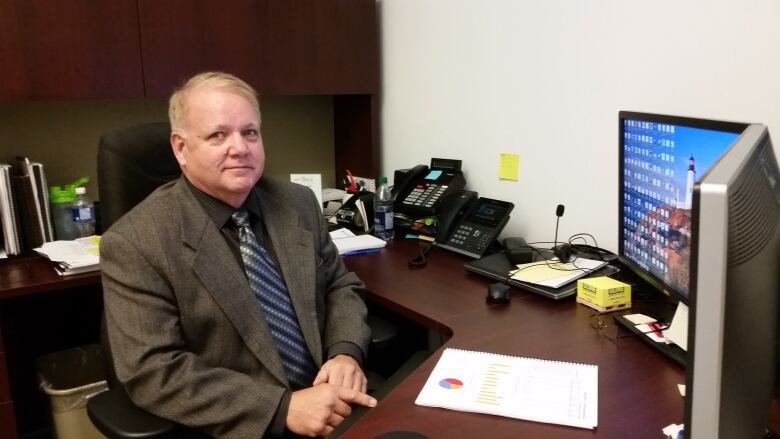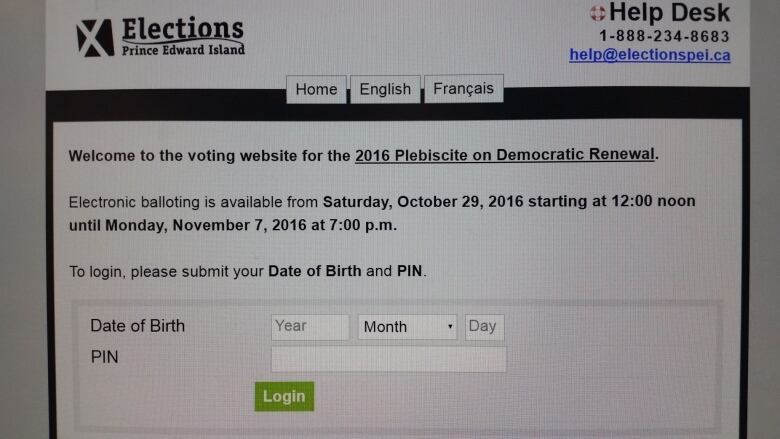'You could literally sit home in your underwear at 2 a.m. and cast your ballot'
E-voting offers 24-hour voting for first time in P.E.I. plebiscite

P.E.I. voters won't be able to say they couldn't make it to the polls tovotein this month's plebiscite on electoral reform.
For the first time, voters will be able to cast their ballots by phone and over theinternet, 24 hours a day in addition to thetraditional paper ballot.
"We're opening up a lot more accessibility for people from their house, from their work," saidP.E.I.'s Chief Electoral Officer GaryMcLeod.

Improving accessibility is one of the key reasons a legislative committee on democratic renewalrecommended e-voting for the plebiscite, according to the committee's chair, Jordan Brown.
"You could literally sit home in your underwear at 2 a.m. and cast your ballot then as you were looking through the different options," he said.
It's the largest pool of voters P.E.I. has ever seen- Jordan Brown, chair of legislative committee on electoral reform.
The plebiscite askingIslanders to choose whether they want a new system to elect representatives to the P.E.I. Legislaturewill be held Oct. 29 to Nov. 7.
Improvingturnout
Organizers hope e-votingwill result in a higher turnout than thelast time electoral reform was put to a plebiscite in 2005.

Only 33 per cent of Islanders bothered to vote then.
"I'm very confident that we will exceed that," said McLeod.
Jordan Brown is looking for a turnout similar to the 65 per cent seen in the1988 plebiscite on whether a fixed link should be built betweenP.E.I. and New Brunswick.
In fact, he has even higherhopes of a turnoutcloser to the 85.9 per cent seen in the last provincial election.
"I'd love to see that. Is it realistic? Probably not," said Brown. "You'd like to see a number that is significant that you can look at it and say enough Islanders have spoken that we have good confidence in the results."
But that may not necessarily be the case "It's not a magic bullet to get more people voting," said Brian Lack, president of Simply Voting Inc., the company managingtheinternetand phone voting.
Ten days for voting
Both of theprevious P.E.I. plebiscites in recent times were one-day events.
This time voting will be held over 10 days, and Islanders can vote at any time of the day or night between Oct. 29 at 12 p.m. and Nov. 7 at 7 p.m.

"We did our damnedest to ensure people had the opportunityto participate in it, and I think this was one thing we kind of honestly thought was a no-brainer, as long as it was technically sound," said Brown.
Internetvoting makes it easier for those living off-Island to vote, including those working out of province temporarily and students at off-Island post-secondary institutions.
In fact, with 101,000 people eligible, "it is the largest pool of voters P.E.I. has ever seen," said Brown, because for the first time 16 and 17 year olds will be included.They were included because they'll be voting agein the next provincial election.
Voters will alsohave the option of casting their ballot in person using the traditional paper ballot.

A first for a provincial ballot
This will be the first province-wide electronic vote in Canada, although communitiesin Ontario and Nova Scotia have experimented with e-votingfor municipal elections since2003, using the internet alone or in conjunction with paper ballots.
- Online voting only for Leamington, Ont., municipal election
- Nova Scotia's e-voting underway ahead of municipal elections
"Among internet voters there was a very high level of satisfaction"duringmunicipal elections in Ontario in 2014, according to Nicole Goodman, author of the Internet Voting Project Report, a review of the electronic voting experience.

Goodman is a director at the Centre for e-Democracy and has an appointment with theMunk School of Global Affairs at the University of Toronto. Of the 414 communities holding elections that year, 58 used e-voting alone, and 39 combined it with paper ballots.
Her report concluded that those who opted to vote online did it primarily forconvenience, but for some it was aboutincreasedaccessibility to voting, whetherdue to physical disability,transportation issues, poor weather, or for students away from homeat post-secondary schools.
"Typically we're hearing more and morepeople say 'Oh I'm too busy to do that.I'm too busy to do this. Making the voting process more accessible by allowing for different types of remote voting can help enable access for people who maybe want to vote but maybe wouldn't have otherwise." said Goodman.
In terms of turnout, her research estimates a general increase of about three per cent.
Cheaper? Not necessarily
Internet voting isn't necessarily cheaper as Elections P.E.I. still has to run polling stations.
"The in-person voting is an expensive venture because we have to hire for this election, we'll be hiring close to200 people,"saidMcLeod.
The province has budgeted$450,000 for the plebiscite, but the need for public education will boost that cost, said McLeod.
It will be"well less" than the $1 million dollar pricetag of a provincial election, he added.
- MORE P.E.I. NEWS | Muslim Society of P.E.I. seeking final resting place for community members
- MORE P.E.I. NEWS | This chef wants every school kid to have a free lunch, everyday












_(720p).jpg)


 OFFICIAL HD MUSIC VIDEO.jpg)
.jpg)



























































































